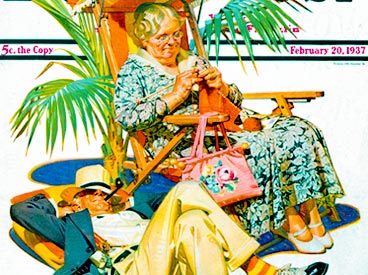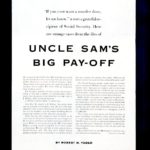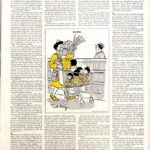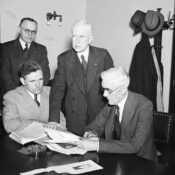in the Jan/Feb issue of the Post, Frederick E. Allen gives us the facts about Social Security and explores its history. That history is well-known to Post readers. In 1955, Robert M. Yoder penned this article, which features a few of the thousands of letters that the Social Security Administration received on a daily basis.
UNCLE SAM’S BIG PAY-OFF
by Robert M. Yoder
Nov. 19, 1955
One reason the Social Security Administration gets mail by the truckload is that every day finds an average of 15,891 Americans in need of Social Security cards. About 8220 need replacements for cards destroyed by accident, lost or stolen. The other 7671 are beginning their working careers.
For the great majority of those setting out to earn a living a card and a number are indispensable. Sometimes you encounter a real hardship case Like that of J. Wilbur, born all but anonymous.
J. Wilbur’s mother wrote in about him:
Dear Sirs: In regard to J. Wilbur. Seventeen years ago on January 14 I birthed a son. He was a fine boy, weighed 12 lbs. at birth. There wasn’t any account number on him anywhere and the doctor attending did not stamp any number on him. He grew up quickly.
When he was old enough he went to school as all other boys do. Learned very fast as he was a bright tot. He has been working on his father and his grandfather’s farms. Wilbur is now in the 11th grade. Mr. Jones asked Wilbur recently would he help him in his meat market on Saturdays. He also told him to write and get him a Social Security card. The boy never before having worked anywhere but on the farm we never did number him nor anyone else number him either. Will you all please number him and send him a Social Security card?
The Social Security people made haste to number poor unnumbered Wilbur, because if you don’t have a number these days you are cooked, and no two ways about it. You would also feel a little left out. For outside of the weather, taxes and the two-sex system, few things concern so many Americans as does Social Security.
Babies by the thousands are supported by Social Security benefits, and the other day a man in Massachusetts asked for a card at the age of 102. Some 69,000,000 citizens contribute every payday or when they pay their income tax, and while only 78,000,000 accounts are active, Social Security actually has a whopping total of 115,000,000.
That many interested parties are bound to have a great miscellany of problems, claims and questions. So it is not surprising that mail trucks bring 300,000 to 400,000 letters a month to national headquarters of Old Age and Survivors’ Insurance activities, in Baltimore, with thousands more arriving at the six area and 532 district offices.
Most of the letters in this Mississippi of mail are routine business correspondence. But there are anxious letters and sad ones. And it lightens and brightens the job that there are also funny letters: From the man who wanted a new card rushed “because I need it to obscure my job with.” From the man whose card “was stolen or picked” in spite of the fact that he was “in a sobber state of condition.” From the woman who thinks Social Security can be turned on like electric service. “I would like to draw Social Security for the coming five months, taking effect the 10th of December,” she wrote briskly. “Due to circumstances beyond my control, I have become pregnant.”
There is a steady stream of letters asking the big social-insurance agency to locate someone. With nice economy of words, one letter painted the picture of a man who finally broke under a great common burden. Many will know how he felt. Said the letter:
“Dear sir: I have a cousin of mine who is missing for three years. He went away to pay his income tax and never showed up any more.”
The assumption that Social Security is on familiar terms with all its millions upon millions of clients brings in letters like the one from Millie. “Please get in touch with Dan, my husband,” she wrote, “and tell him to call or write home right away, the bathroom is out of order, water is leaking under the house. I don’t have money to fix it. Thinks.”
Social Security and the Railroad Retirement Act are correlated. It may be necessary to decide which fund pays a wage earner’s survivors. So a standard question is asked: did the wage earner ever work for a railroad? To many, the question seems odd. To one widow it seemed entirely natural. “My husband never worked for a railroad, ever,” she wrote. “You must be thinking of his brother, Willie.”
Social Security knows a Willie or two, she was right about that. In Smiths alone, they’ve got some 32,000 Wills, Willies, Williams or Bills. But Social Security doesn’t know all its clients personal-like, as you might say—not as well as the widow seemed to think.
Name changing produces a lot of mail, including this little lament: “Sir: I was living here under another name on account of a woman. She said to go under that name. Which she has gone and got me into a mess of trouble under that name. So please sign my card in my right and lawful name.”
“Dear sir,” one woman wrote impatiently. “As you was asking why wasn’t my name the same on Item 1 and 3. So as you may know. People are always getting married. Arn’t they? And that is exactly what I done.”
People sure always are, and it is tough to keep up with some of them. An impulsive Texas girl asked for a new card on February second because she had just married. She wrote next to ask for the old card back “as I am no longer married.” That was on February third.
Or they don’t quite get married, and it takes several letters to find out just what the deal is. When an insured wage earner died, in the Southwest, it appeared he had a common-law wife to whom benefits should be paid. But Rosa, the lady in the case, said the relationship was purely informal and for fun. “I was just room here,” Rosa wrote, “and he was my boy friend. Because I have a husband.”
A widow’s right to receive benefits sometimes is beclouded by a previous marriage. In Lucy’s case, Social Security needed assurance that Lucy’s first marriage, to Frank, had terminated in some definite way. Lucy wrote back that it was definite enough.
“You want to find out how my marriage to Frank ended. Well, sir, I DEVOURED him. Signed with my own hand, Lucy.”
Another widow, hoping for benefits as the survivor of Husband No. 2, needed evidence that her first husband was not an impediment. She wrote her mother in Mexico. Mamma replied with spirit.
“How thoughtless are the gentlemen,” she wrote. “You first husband is now dead and it is impossible to dig him out of the cemetery. I am very sorry. If he were alive I would have found him and would have sent you his head in a box.”
What mamma had against poor Juan, or Pedro, or whatever, she didn’t say. He may have been shiftless. Some men are. As this letter makes clear:
“Dear Social Security: My husband took sick January 20 and died Feb. 27. He hasn’t earned anything since.”
Sometimes a mix-up is Social Security’s fault. The administration got one card back with the complaint “You spelt my name rong.” But a little confusion is inevitable. A Mississippian with a card in one name began using another. Asked why, he explained that his mother had just remarried, at eighty-four. Her boy, aged sixty-five, had taken the name of his new papa.
On suitable proof of death, a lump-sum payment is made to defray funeral expenses. Often something less definite than a death certificate must be accepted, since not everyone dies in bed. Social Security was satisfied in Emil’s case. For about Emil’s passing, to a watery grave, a witness wrote this:
“The last I saw of Emil he was pulling on the whistle frantically to signal the other boats with one hand and holding the wench with the other.” They assume the writer meant “wrench” or “winch,” but in any case it seemed clear that Emil was gone.
Sam’s friends didn’t see him make his exit, but they were confident Sam was a goner. Said a letter about this:
“Dear sirs: Everybody here is sure that Sam is dead. We and the police looked everywhere for him. He was very regular and we could always count on where he was if he wasn’t home. At Johnny’s Stag Bar they said they knew he’d walk in the door at 5:30 on the dot every night. But he never came that night, so I know he must be dead.”
Jimmy’s wife said there was no doubt in her mind about Jimmy either. She knew him. He was dead, all right, or he’d come home for meals.
“Gentlemen: I know what’s in your mind. You think that James walked out on me. Well, he threatened to, often enough, but he never meant it. He liked his comfort too much and he couldn’t eat restaurant cooking. If he’s still alive, it would be a big surprise to me. It just wouldn’t be like him.”
Usually the lump-sum payment, running from $90 to $255, is to a close relative. Occasionally the expenses are borne by a seeming stranger. Then Social Security looks into the circumstances. “You were hardly more than a casual acquaintance,” one man was told. “Why did you pay this man’s funeral expenses?” His answer was simple, plain and without a trace of self-glorification.
“Well, sir, I had to,” he said. “He warn’t in no shape to do it.”
What with one thing and another, Social Security people are hard to surprise. Even so, one death notice hoisted their eyebrows, for it seemed to come directly from the late lamented. It was a letter apparently asking for the lump-sum payment, and it said:
“I, Enola, died Sept. 14. Please answer and let me know. Thanks.”
That line of Thomas Gray’s about “the short and simple annals of the poor” is much admired. Any Social Security correspondence reviewer would observe, however, that the poet didn’t know many poor people. Their affairs, financial and domestic, can be complex in the extreme. The same is true of men and women in middling circumstances. One of Social Security’s widows has married nine times since they began keeping track of her. Nine husbands, all different, wouldn’t present much of a problem, but she favors two men, marrying first one and then the other. And in interludes of singleness she prefers to revert to her original married name; though it has been explained to her that she can no longer claim widow’s benefits.
The “ordinary man” frequently turns out to be an extraordinary fellow indeed, battling extraordinary problems. The proprietor of a coal yard was reproached for not keeping up on the reports an employer must make. He replied that he was having woman trouble, at age seventy-two.
“I would have complied long ago if I could,” he wrote. “I have a wife seventy years old. My business doesn’t justify me having someone just to do my writing. I can’t keep a combination housekeeper and to do my work because my wife is so jealous. No one will stay long enough to learn the work. She makes them sleep in the hall or in the room with her, when we have plenty of vacant rooms. If you have any suggestions that will help, I’ll be glad to co-operate.”
Many a big-business executive might not be able to take the troubles which snap and yap at the little businessman. Sometimes they prove to be more than the little businessman can take. Reproved for not filing returns on time, one man—the names are fictitious—replied as follows:
“Sir: I had an accountant, a Mrs. Warren, that got pregnant. Everybody was so surprised, but she and her husband seemed to know all about it. One day she was working and the next day she was in the hospital and back and forth she went.
“She had various employers, and one, a Mr. Phillips, overdrank and dropped dead. This caused Mrs. Warren to miscarry her baby, and by the time I got my books out of this six months calamity I am surprised that any of it was reported correctly.
“I paid the accountant to do the work and she was supposed to do it right as well as the accountant who took over from her. I was very careful to get a man that time as I found out you can’t do anything with a pregnant bookkeeper. However, the man I got turned out to be a preacher on the side. I finally got so discouraged I sold the damned hotel.”
There are days when you can’t lay up a dime, whole years when working gets you nothing much but exercise. The self-employed sometimes find themselves—in the expressive phrase of one Social Security claimant—”suffering from inability.” A farmer reported that he raised a lot of hogs, sold them, and sat down to figure out his income, so he would know how much Social Security tax to pay. No matter how many times he figured it, he said, he came to the same conclusion—no loss, but not a nickel’s profit for all his labors with those hogs. “Anyway,” he reported philosophically, “I enjoyed their company.”
“Please use the back door,” a Social Security field worker was directed, “as the front steps don’t exist.” That is often the case with birth certificates, and establishing correct ages may be tough. If there is a family Bible, that may help. The Bibles often contain a wealth of information, crisply reported. In one, after a whole list of children born to one union, there was this terse notation: “Maw quit Paw—June, 1923.”
To one woman it was suggested that her husband might have documents bearing on her age. She replied in wrath. “I dare you to write me about him any more. Please remember that I did not live with that sorry man and do not class myself with that trash. These people may be your class, but not mine.”
Another didn’t remember the date of her birth, but did remember the gunfire which that event occasioned. “There was doubt,” she wrote, “as to my rightful father. I can faintly remember seeing five men shot over my birth or my existence when I was around five or six years old.”
Social Security workers are an enthusiastic lot, who regard the big insurance program as the happiest thing to happen to this country in many a year. Some of them have voluntarily postponed their vacations four and five years hand-running, to keep the work rolling; some field representatives put in a fourteen-hour day straightening out the affairs of men and women in remote communities. Effort like that is bound to generate friendship. Many a business house gets a good response when offering an informative booklet. But its customers probably don’t enclose a quarter for a free booklet, and write, as one man wrote to Social Security: “please take contense and go and git you a bottle of beer.”
The friendly feeling shows up in chatty letters full of neighborhood or personal news notes. Like this:
“Dear sir: They told me you want to get rid of a typewriting machine you all have. I would be tickled to own one. I would give you good money for it. It would be real nice to write a letter and not have to use a pensil, my pensil is always broke and the butcher knife is dull because the baby digs holes in the yard with it. I got the money left from the hawg I razed last yr. I had to use part of it when our cow got the black leg. It didn’t do no good. Old Pansy dyed enyway. Yr true fren—“
“I don’t know how you figured my check,” wrote a satisfied customer, “and I don’t care. But I think it was largely owing to the good job you did. If you ever want a murder done, let me know.” Another wrote: “Never was allowed a Social Security number before. I’ll be just as tickled with it as a pig with a tail on both ends.”
On the other hand, there is no telling what simple question will provoke a storm. Applying for an account number, one man failed to supply his father’s name. Asked for it, he wrote as follows:
“Stranger: You can get my father’s name from the county court house. I positively will not give it to you. To hell with any number or anything else as far as I care. It seems to me a lot of you people want to know too dam much that is none of your business.”
There is a steady demand for advice on problems of heart and home. One sixty- four-year-old woman would in a year begin drawing widow’s benefits. But she was engaged, she explained, to a man of sixty-five. She wondered: Would she be better off, benefit-wise, as a widow or a bride?
“As a wife,” she was told, “you will have to be married three years before you can draw benefits.”
She said promptly that she would call the engagement off. “It pays to go into these things,” she said. “Three years, is it? I just don’t think it’s worth it.”
But Social Security felt duty-bound to show her the whole picture. In the unhappy event that her new husband died after hardly more than a taste of wedded bliss, she could draw benefits after one year of marriage to him. That put a different complexion on things. Three years, no. One year, yes. “In that case,” she said briskly, “I’ll just go ahead with my plans to marry and thank you very much.”
Now and then a little confusion develops over mothers’ benefits. A young widow draws benefits of this nature, but they stop if she remarries. Even so, payments to small children go on. Little Howard’s mother got a mothers’ benefit check after she had remarried. She wasn’t entitled to it, and sent it back, announcing her decision:
“I have married, but Howard is still with me,” she wrote. “I am sending the check back and keeping Howard.”
There are letters written in black despair, from those trapped in an impoverished old age. But there are others from good jaunty souls meeting old age with fine serenity. Notifying Social Security that it was time to start sending those checks, one man wrote:
“Well, the wheels has rolled around to three score and ten. I understand I shall receive a donation from our good old U.S.A. I have the enclosed number and am self-employed. I have purchased me a rod and reel and a .22 to kill frogs for bait. I have retired.”
In only twenty years, Social Security has become “a basic resource . . . for most American families,” in the phrase of Commissioner Charles I. Schottland. It is “the cornerstone of the Government’s programs,” as President Eisenhower put it, “to promote the economic security of the individual.” And an old boy in Denver figured the program could increase its usefulness by doubling as a matrimonial bureau. After a Colorado disaster, it was announced that the women widowed by the blast would receive as much as $25,000, over the years. A sharp-eyed widower at once took pen in hand.
“I am at home after 4:30 every evening,” he wrote, “and would like to meet some of those nice women.”
A further testimonial comes from an oldster who said this mighty piece of social engineering had tided him over just fine until he found something which was more fun. Returning a pension check, he wrote:
“It is with great pleasure that I inform you that I have returned from the never-never land of retirement to the land of the living, the ranks of the employed. At 70 years of age, a bachelor, with a book-keeper’s career behind me, I am starting a new career as a salesman of household products. I am going out into the wide world and meeting the fairer sex on equal terms. I find ladies in almost every kitchen who look with favor on me, who take pleasure in inspecting my wares and chatting over a cup of coffee.”
Ladies whose husbands, he added smugly, “apparently do not have the gift of conversation,” though all right at earning money, with which to buy household products.
A great many of the letter writers want a general description of the whole program. In this thirst for knowledge, this praise-worthy interest in public affairs, they may even be impatient. Like this:
“Dear sir: It seems like we just get our card game going when someone starts in on politics or something, lately its been income tax and Social Security. What conditions must excist before Social Security can be collected and how is it firgured? Please settle our argument so we can go on with our card game.”
To read the full original article, see below.
[embedpdf width=”700px” height=”900px”]http://www.saturdayeveningpost.com/wp-content/uploads/satevepost/uncle_sams_big_pay_off_orginal.pdf[/embedpdf]
Become a Saturday Evening Post member and enjoy unlimited access. Subscribe now






